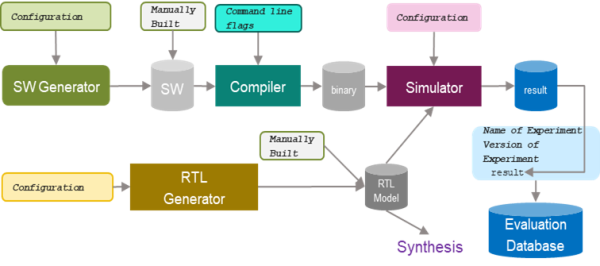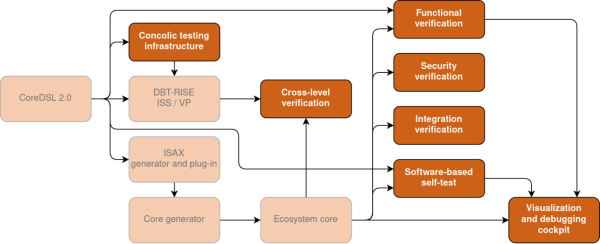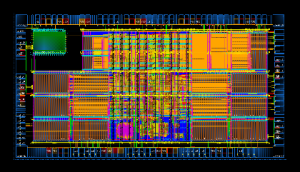Im Rahmen des RISC-V Summit 2024 wird die erste Scale4Edge-Roadshow durchgeführt.
Scale4Edge Partner präsentieren Poster, Vorträge und Demonstratoren.
Die Scale4Edge-Partner stehen für persönliche Gespräche bereit. Bitte vereinbaren Sie Termine mit Andreas Vörg <voerg![]() edacentrum [dot] de>
edacentrum [dot] de>
Power-efficient edge AI applications have an enormous market potential. Key factors for a competitive hardware solution in this domain are energy efficiency and low silicon area in relation to computing performance. SpiNNcloud Systems GmbH is closely collaborating with TU Dresden in this domain for transferring cutting-edge research and development on AI hardware accelerators into commercially viable applications.
Within the Scale4Edge project, TU Dresden has developed the SpiNNedge AI accelerator IP for audio keyword spotting applications and beyond. Key focus of SpiNNedge is the reduction of on-chip memory and processing effort by hardware-optimized preprocessing and exploitation of sparsity in neural network based classification. With on-chip memory being one of the core drivers of silicon area and static power, SpiNNedge helps to significantly improve in both factors.
But an AI accelerator alone is worth almost nothing in isolation. Integration in the Scale4Edge ecosystem made SpiNNedge useable and created a commercial potential. The Scale4Edge RISC-V ecosystem core by MINRES runs the application with an offloading of key processing tasks for keyword spotting to the SpiNNedge accelerator. The customizable RISC-V core solution could be perfectly adapted to the needs of the keyword spotting application. Moreover, Scale4Edge made a joint effort to provide software support for hardware extensions of microcontrollers in the widely adopted machine learning compiler Apache TVM. This is highly beneficial for the useability of an accelerator like SpiNNedge, as it bridges the gap between hardware IP and high-level software frameworks for machine learning that users employ to develop their edge AI applications.
TU Dresden has successfully implemented a test chip for audio keyword spotting, integrating the SpiNNedge accelerator with a customized MINRES RISC-V core into an overall processing chain from microphone input to detected keywords. The chip realizes a hierarchical processing approach, first detecting speech in the microphone input, and then starting keyword classification. Speech detection is performed by the ZEN accelerator module, which won a 1st prize in the BMBF German innovation competition "energy efficient AI systems". The chip has been implemented in GlobalFoundries 22 FDX technology, employing adaptive body biasing (ABB) IP for leakage power reduction, developed and provided by Racyics, a spin-off of TU Dresden.

Figure 1: Core Layout of the keyword spotting test chip by TU Dresden. Core part is the processing element (PE) with TU Dresden's SpiNNedge accelerator and the MINRES RISC-V core.

Figure 2: Demo board for keyword spotting with the test chip by TU Dresden (white, center)
The processing element with the MINRES RISC-V core and the SpiNNedge accelerator performs real-time keyword spotting in 34 uW, achieving a classification accuracy on the widely-used Google speech command dataset of over 95%, which outperforms most of the existing low-power hardware solutions for this use case. A demo board has been implemented to showcase the solution.
The mission of SpiNNcloud Systems is to design energy-efficient AI systems by leveraging practical inspiration from the brain. Its core product is a holistic computing solution ranging from chip design, software development to deployment of full data center servers. Despite our large-scale supercomputers being built leveraging Arm IP, our constant commitment to pursue innovation in an Edge2cloud continuum has led us to evaluate different solutions at different scales. SpiNNcloud is highly interested in commercializing Edge AI solutions, in which the Edge IP built in Scale4Edge stands as a clear and attractive building block. The flexibility of these custom-extended RISC-V cores allow a path to achieve ultra efficient operations at the edge. Furthermore, the Scale4Edge Ecosystem provides a quick start for us into an efficient Edge exploration including know-how from compilers, functional safety, ISA-extensions and chip design methodology among others. Additionally, it introduces us to a wide variety of best practices that can boost development speed and reduce technical risks, all crucial to ensure commercial success. Strategically the consortium enables a fully European ecosystem, especially a German one, with technological independence that increasingly becomes more important to protect and foster companies in the field of computing.
Cont@ct:
TU Dresden | Dr.-Ing. Johannes Partzsch | johannes [dot] partzsch![]() tu-dresden [dot] de
tu-dresden [dot] de
MINRES | Eyck Jentzsch | eyck![]() minres [dot] com
minres [dot] com
SpiNNcloud Systems GmbH | Matthias Lohrmann | matthias [dot] lohrmann![]() spinncloud [dot] com
spinncloud [dot] com
https://www.edacentrum.de/scale4edge/
Further Scale4Edge partners and sub-contractors
Die Partner der BMBF-ZuSE-Projekte KI-Mobil, KI-Power und Scale4Edge freuen sich darauf, sie in Kaiserslautern zu treffen!
Teilnahmeregistrierung: https://eveeno.com/130451080
| 16:00 | Eröffnung Grußwort Einordnung in ZuSE |
| 16:20 | „Die Rolle von Prozessoren bei den europäischen/deutschen Bemühungen um Halbleitersouveränität - Herausforderungen und Chancen” Impulsvortrag Prof. Norbert Wehn, RPTU Podiumsdiskussion Moderator: Prof. Wolfgang Nebel, edacentrum Teilnehmer: Mario Brandenburg, parlamentarischer Staatssekretär BMBF Prof. Armin Dietz, Technische Hochschule Nürnberg, Projektkoordinator KI-Power Prof. Wolfgang Ecker, Infineon, Projektkoordinator Scale4Edge Eyck Jentzsch, MINRES Technologies GmbH Dr. Hans-Jörg Vögel, BMW Group, Projektkoordinator KI-Mobil |
| 17:30 | Pause |
| 17:45 | Projektvorstellungen Prof. Wolfgang Ecker - Scale4Edge Dr. Hans-Jörg Vögel – KI-Mobil Prof. Armin Dietz – KI-Power |
| 18:45 | Poster und Demos aus den ZuSE Projekten mit Stehempfang |
| 19:45 | Gemeinsames Abendessen im Fritz Walter Stadion |
| 22:00 | Ende der Veranstaltung |
The Scale4Edge project aims to create an efficient RISC-V ecosystem for edge application optimization. It focuses on developing a versatile platform to provide cost-effective, application-specific edge devices and services for various market segments. This is achieved through fine-grained adaptation of generic components, covering CPU instructions, user/application software, and operating system/firmware levels. The ecosystem is highly scalable and customizable to individual applications, supporting various hardware architectures and non-functional properties like energy efficiency, fault tolerance, reliability, safety, and security.
The Scale4Edge ecosystem currently contains three different compilers, addressing different use-cases of the ecosystem:
CompCert is a compiler for the C programming language (https://www.absint.com/compcert/). It accepts most of the ISO-C 99 language, with some minor exceptions and a few useful extensions. Its intended use is the compilation of life-critical and mission-critical software written in C and meeting high levels of assurance.
What sets CompCert apart from any other production compiler is that it is formally verified, using machine-assisted mathematical proofs, to be exempt from miscompilation issues. In other words, the executable code it produces is proved to behave exactly as specified by the semantics of the source C program. This level of confidence in the correctness of the compilation process contributes to meeting the highest levels of software assurance. Using the CompCert C compiler is a natural complement to applying formal verification techniques (static analysis, program proof, model checking) at the source code level: the correctness proof of CompCert guarantees that all safety properties verified on the source code automatically hold as well for the generated executable.
In 2022, the Association for Computing Machinery, ACM, presented the CompCert development team with the prestigious ACM Software System Award (https://www.absint.com/releases/220511.htm) and the ACM SIGPLAN Programming Languages Software Award (https://www.sigplan.org/Awards/Software/).
During the Scale4Edge project, CompCert was given a backend for RISC-V. CompCert for RISC-V generates code for the base instruction sets RV32I and RV64I with standard extensions M (Integer Multiplication and Division), F (Single-Precision Floating-Point), and D (Double-Precision Floating-Point). CompCert for RISC-V has been combined with picolibc (https://github.com/picolibc/picolibc), a C library designed for embedded 32- and 64-bit microcontrollers with small memory. After some changes proposed by the CompCert developers (mostly to avoid GCC/Clang specific language extensions), the picolibc source code can now be compiled with CompCert.

Existing toolchains with RISC-V support cannot yet be flexibly extended to quickly support ISA extensions. In addition, RISC-V extensions in the Scale4Edge project are described using a separate language called CoreDSL. An automated translation of these CoreDSL definitions into corresponding toolchain extensions, as far as possible, is therefore not only desirable for reasons of flexibility, but also almost inevitable for reasons of consistency. For this reason, the described hardware (processor core) and a virtual platform and a compiler with support of custom defined instructions can be generated from CoreDSL. We have successfully automated the modification of Clang/LLVM to support custom instructions throughout the whole software toolchain (compiler, linker debugger), as depicted in the figure. Based on a CoreDSL description of the custom instructions, the extendible compiler toolchain (called X-LLVM) implements a compiler generator (called CD2TG) to provide the defined custom instructions as assembler code or intrinsic function for explicit usage. If possible, custom instructions are also implicitly used by the compiler (e.g., MAC (Multiply Accumulate) or Zero Overhead Loop). If this were done based on a manual translation, there would be a potential for an incorrect or at least inconsistent translation at each individual step. By automating this process, these errors can be avoided. Another benefit of automation is the speed with which the different artifacts can be regenerated. For example, if a new CoreDSL description is created or an existing description is revised, the corresponding tool chains can be triggered directly to generate the different artifacts and thus be able to test the newly defined instructions directly and revise them further if necessary. The current open source release of X-LLVM is available at https://github.com/DLR-SE/extensible-compiler.

gcc supports plenty of optimization opportunities, most can be controlled by over 120 command line flags.
The Infineon RISC-V RTL generator supports also plenty of configurations (superset of CoreDSL) to generate a huge number of RISC-V variants differing in function, performance in clock cycles and performance in clock period. From the perspective of compiler performance analysis, the number of clock cycles is relevant. The maximum clock period is provided by the synthesis – or better R2G – flow. Performance evaluation is done by RTL simulation but can be moved to FPGAs and Emulation as RISC-V or SoC features (Timers) are used to measure time. For evaluation, classical benchmarks but also generated software has been applied. Of course, the framework is also used to run regression over the complete generation chain and validate the compiler result for a specific code and application.
Results worth mentioning are a substantial impact of compiler optimization, more performance when comparing to other non-RISC-V cores but also a non-neglectable memory footprint overhead.
Cont@ct:
CompCert | Reinhold Heckmann | AbsInt Angewandte Informatik GmbH | heckmann![]() absint [dot] com
absint [dot] com
X-LLVM | Kim Grüttner | German Aerospace Center (DLR) | kim [dot] gruettner![]() dlr [dot] de
dlr [dot] de
GCC | Wolfgang Ecker | Infineon Technologies AG | wolfgang [dot] ecker![]() infineon [dot] com (wolfgang.ecker@infineon.com)
infineon [dot] com (wolfgang.ecker@infineon.com)
Further Scale4Edge partners and sub-contractors
For a commercially successful development of edge devices for a wide range of applications, a whole ecosystem of tools and hardware components is mandatory. Ensuring the safe, secure, and reliable design and operation of these devices is an indispensable, but challenging requirement for many of these applications. The Scale4Edge project aims to address this challenge by enabling a comprehensive RISC-V-based ecosystem that helps ensure the correct and secure functioning throughout the whole design process and lifetime of an edge system: The ecosystem encompasses tools for functional verification—both using virtual prototypes in an early stage of development and using formal methods—, security verification, software-based self-test (SBST), and system visualization and debugging. With the development of this hardware verification and validation ecosystem, the Scale4Edge project aims to create optimized and reliable edge devices that meet the high demands of modern industries.

Figure 1: The Scale4Edge Hardware Verification Ecosystem
The Scale4Edge project has made significant strides in hardware verification and validation for RISC-V platforms, with multiple partners contributing to its success. The components of the hardware verification ecosystem are shown in Figure 1. The University of Bremen developed a comprehensive cross-level verification approach and a concolic testing infrastructure. Siemens EDA—an associated partner—created new functional verification tools for processor verification while the University of Kaiserslautern-Landau (RPTU) focused on formal security analysis with Unique Program Execution Checking (UPEC). The FZI Research Center for Information Technology (FZI) devised methods for specifying, generating, and verifying hardware properties in System-on-Chip (SoC) platforms, with the University of Freiburg and Concept Engineering contributing to in-field monitoring and testing (SBST) as well as debugging and visualization tooling. The collaborative efforts of the project partners around the Scale4Edge ecosystem core, developed by MINRES according to the ISO 26262 safety standard, resulted in a comprehensive hardware verification and validation flow with award winning methods and industry-proven EDA tools.
 Many application domains including automotive, industry automation, IoT, and space, require the usage of well-tailored edge devices capable of processing data from various sensor sources using AI, DSP, and classical software algorithms. Data processing at edge devices must satisfy real-time requirements while consuming as little electric energy and memory footprint as possible. Moreover, for many applications, the aspects of safety, security, and reliability are equally important as performance or electric energy consumption. Therefore, application-specific system-on-chip architectures for edge devices require high customization in terms of the most appropriate performance class of the processor core including necessary custom processor extensions, the memory architecture and capacity, and the design of a parameterizable AI accelerator architecture. The BMBF project Scale4Edge aims at enabling a comprehensive RISC-V-based ecosystem to efficiently assemble optimized edge devices.
Many application domains including automotive, industry automation, IoT, and space, require the usage of well-tailored edge devices capable of processing data from various sensor sources using AI, DSP, and classical software algorithms. Data processing at edge devices must satisfy real-time requirements while consuming as little electric energy and memory footprint as possible. Moreover, for many applications, the aspects of safety, security, and reliability are equally important as performance or electric energy consumption. Therefore, application-specific system-on-chip architectures for edge devices require high customization in terms of the most appropriate performance class of the processor core including necessary custom processor extensions, the memory architecture and capacity, and the design of a parameterizable AI accelerator architecture. The BMBF project Scale4Edge aims at enabling a comprehensive RISC-V-based ecosystem to efficiently assemble optimized edge devices.
By using the Scale4Edge ecosystem, the project partner Bosch developed a neural-network based audio event detection model. This use-case has been ported to a Pulpissimo-based SoC platform[1] using components and software of the Scale4Edge ecosystem.
Abstract
Standards are known to slow down research and innovation in their area. Therefore, one might fear that the RISC-V ISA, as a standard, slows down processor and ISA development.
@embedded world 2022, 21.6.2022 11:00: https://www.embedded-world.de/en/conferences-programme/programme-overvie...
Rafael Stahl (Technical University of Munich)
Die Entwicklung und den Einsatz von vertrauenswürdigen Spezialprozessoren in Deutschland vorantreiben – so lautet das Ziel von „Scale4Edge“. Unter der Koordination von Infineon nehmen sich insgesamt 22 Projektpartner dieser Aufgabe in den kommenden drei Jahren an. Erste Ergebnisse werden bereits Ende 2020 erwartet.